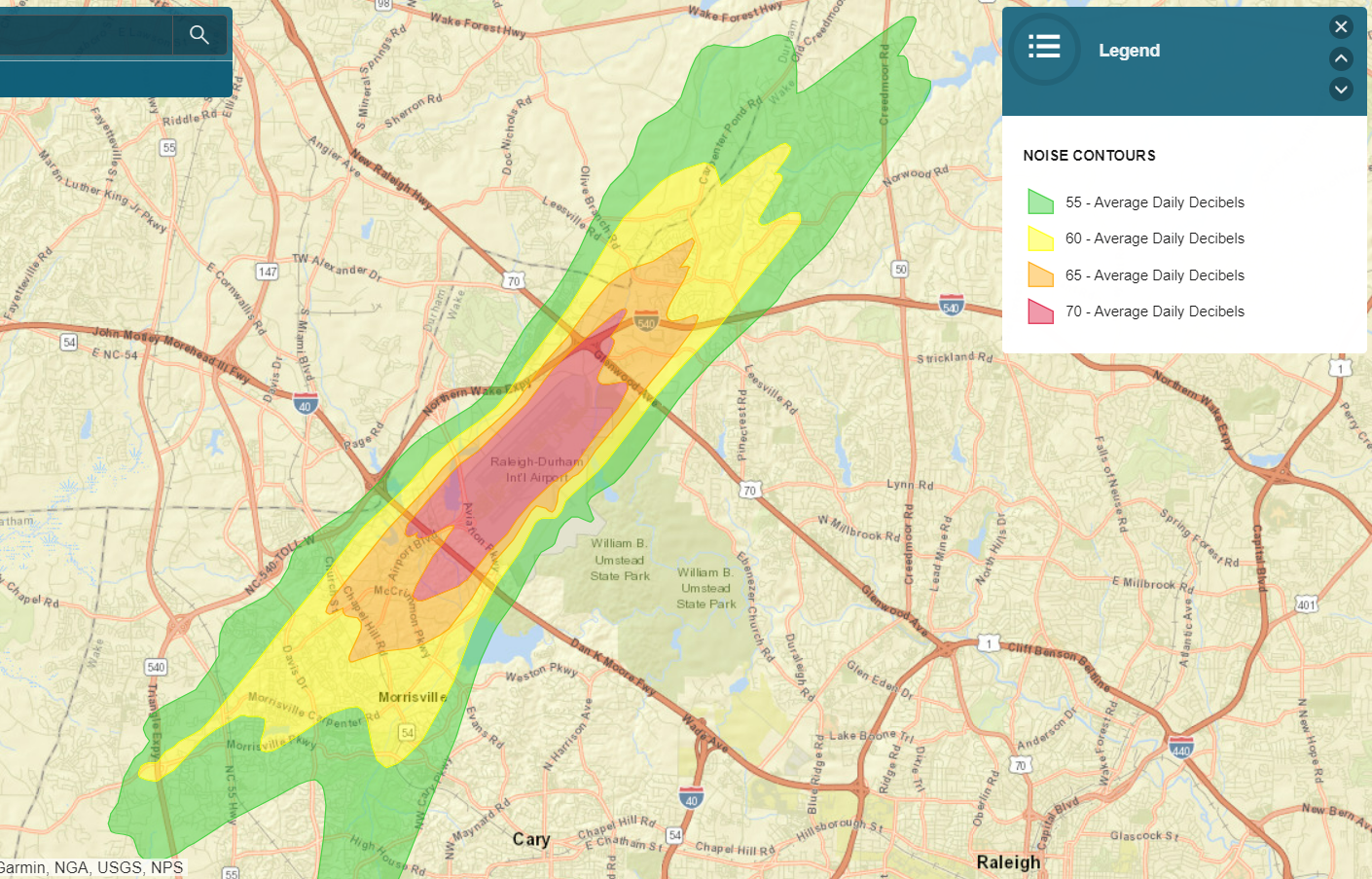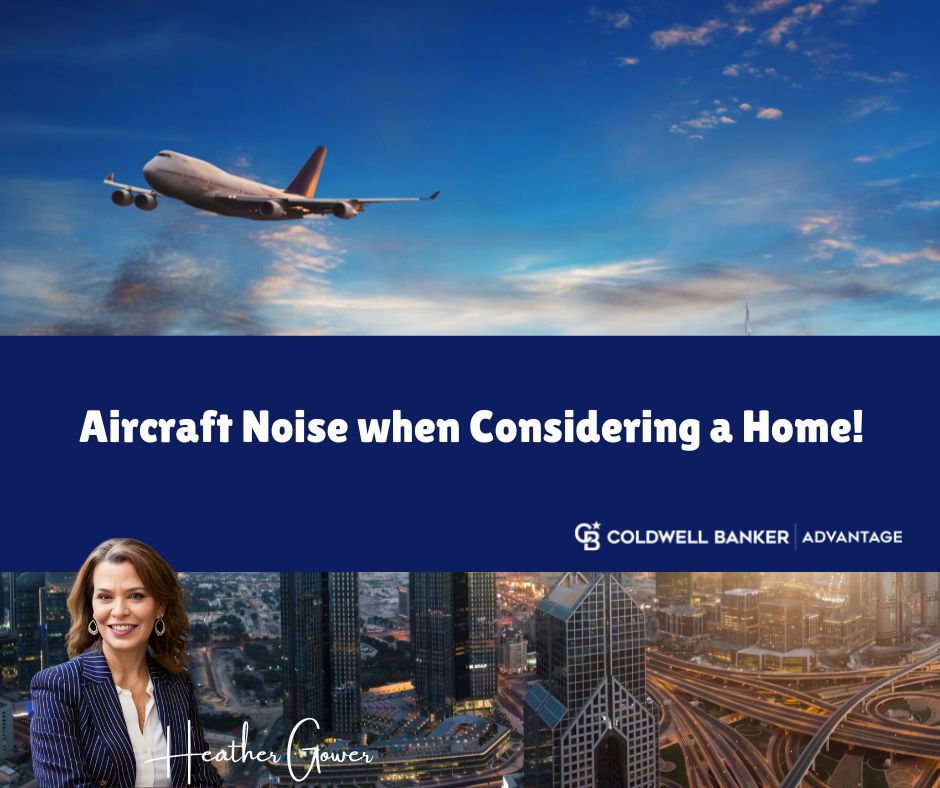
Aircraft Noise when Considering a Home
Aircraft Noise when Considering a Home
Do you ever wonder about where the aircrafts will be? Do you wonder if your home will be affected by the sound? If you are concerned about Aircraft Noise read below to have a better understanding of the flight paths and noise.
Evaluating Aircraft Noise
If you’re concerned about aircraft noise when considering a home, it’s essential to visit the potential home site multiple times and on different days. Pay special attention during peak air traffic hours: early mornings between 6:00 AM and 9:00 AM, and evenings from 5:30 PM to 9:00 PM. Keep in mind that aircraft operate at Raleigh-Durham International Airport (RDU) 24/7, 365 days a year.
You can monitor flight patterns in real-time using the Flight Tracking System. For detailed information on how aircraft noise might affect a specific property, contact the Noise Office at rdunoise@rdu.com or call 919-840-2100 ext. 3.
Understanding Noise Disclosure
Under the Residential Property Disclosure Act, North Carolina General Statute 47E, sellers must disclose noise conditions for homes in noise-impacted areas around RDU when reselling. This is required for properties in areas like Durham County and Wake County.
Exemption for New Homes
Note that newly built homes sold for first-time occupancy are exempt from this disclosure requirement. However, if you purchase a newly constructed home in a noise-impacted area, you will need to disclose any noise issues if you decide to resell the property. For any questions about noise disclosure, contact the Noise Office at 919-840-2100 ext. 3.
Noise Impact Areas
The noise-impacted areas around RDU are illustrated on the RDU Composite Noise Contour Map. This interactive map allows you to search for specific properties by entering an address in the search bar in the upper right corner. The map highlights areas expected to experience average noise levels above 55 dB DNL (Day-Night Noise Level), shown within the green contour. Keep in mind that aircraft noise can also be heard outside these designated contours.
By being informed and utilizing these resources, you can make a more confident decision when purchasing a home in areas affected by aircraft noise.

RDU Contour Noise map
Flight Tracking System Overview
The RDU flight tracking system offers comprehensive information about flight operations, including landings, take-offs, and transient flights. It provides details on the runways used, aircraft types and registrations, altitudes, and other relevant flight data.
With this system, you can perform historical queries, determine the closest approach points for individual aircraft, and view detailed flight paths and altitudes. It also allows you to see sound levels and other features to better understand the aircraft traffic near RDU.
For access to the FAA radar data for the region around RDU in near real-time, click here Authority’s flight tracking system.
Using the Flight Tracking System
Before diving in, please review the usage guide by clicking the “?” symbol in the welcome message. This will help you navigate the system effectively.

Flight path RDU
Limitations
Please note that the flight tracking system does not track or provide information on military aircraft or their flight paths. By using this tool, you can gain valuable insights into the aircraft operations around RDU, enhancing your understanding of local air traffic.
Noise Inquiries and Complaints
To submit an airport related noise inquiry or complaint click here. Please complete all fields in order for staff to provide a timely and thorough response. The Noise Office can be reached at 919-840-2100 extension 3.
Frequently Asked Questions about Aircraft Noise.
Am I required to disclose aircraft noise when selling my home?
Yes, under the Residential Property Disclosure Act (North Carolina General Statute 47E), you must disclose aircraft noise if your home is in an area where the average daily noise level is 55 decibels or higher, as shown on the (RDU Composite Noise Contour Map). This disclosure must be part of the sales contract for resale properties. If the noise level is below 55 decibels, disclosure is not required, even if flights are overhead. An example disclosure is available in the Real Estate section of the RDU noise website.
How can I determine the impact of noise when purchasing a home?
It’s important to visit the property and experience the noise firsthand before purchasing. Additionally, the (RDU Flight Tracking System) can show you daily flight paths in relation to a specific address. To use the system:
1. Click the house-shaped icon in the left sidebar to enter an address. This is the fourth icon from the top and is labeled “Location Search” when hovered over.
2. After mapping the address, click the line graph icon in the left sidebar to view radar (flight) tracks. This is the third icon from the top, labeled “Track Presets” when hovered over. The system defaults to the current date/time, but you can view past data by selecting a different date at the top of the page.
*Note: Aircraft operate at RDU 24 hours a day, 365 days a year.
I can see aircraft flying overhead; why wasn’t I provided an aircraft noise disclosure?
Noise disclosure is required only for homes in areas where the average daily noise level is 55 decibels or higher, as shown on the RDU Composite Noise Contour Map). The presence of aircraft overhead does not automatically necessitate disclosure unless the noise level threshold is met.
Can the Authority change the flight tracks so that aircraft don’t fly over people’s houses?
No, the FAA manages the National Airspace System, including all flight paths and altitudes. The FAA designs flight procedures and corridors to ensure safety and efficiency, preventing mid-air collisions. The Authority does not control or regulate aircraft movements.
Can aircraft be restricted from flying at RDU at nighttime?
No, the Airport Noise and Capacity Act (ANCA) of 1990 prevents airport operators from imposing access restrictions, such as curfews, without FAA approval. Since RDU did not have a curfew before ANCA, it cannot impose one now. Several airports have petitioned for nighttime restrictions since ANCA, but all requests have been denied.
Why are helicopters allowed to fly late at night from RDU?
Helicopters are subject to the same FAA regulations as fixed-wing aircraft, and airports cannot impose nighttime restrictions on them.
Why do some jet aircraft fly lower than others on approach?
The FAA requires aircraft to maintain a precise glide slope on final approach. Larger aircraft may appear lower, and pilots sometimes add power while descending, creating additional noise. Weather can also affect flight paths and altitudes.
Why are aircraft still flying over my house after I’ve submitted a complaint?
The Authority does not control airline schedules or aircraft movements. The FAA manages the National Airspace System, which is open to all aircraft.
Why are loud military jets allowed to operate at RDU?
The federal government has the right to use RDU for military operations, and military jets are not subject to FAA noise requirements. Non-combatant military aircraft often meet current noise standards. The N.C. Army National Guard (NCANG) also uses RDU for its helicopters.
Will aircraft get quieter?
Yes, airlines are continuously replacing older, noisier aircraft with newer, quieter, and more efficient models. The FAA and NASA are researching new technologies for further noise reduction.
Is a new runway being built at RDU?
Yes, planning has begun to replace Runway 5L-23R, the west runway near Terminal 2. The new runway will be farther from Terminal 2 to meet FAA standards, allowing the current runway to remain operational during construction. This project is in the environmental review and planning stage.
Who can I contact to inquire or complain about aircraft noise?
You can report noise inquiries and complaints online File complaint here or contact the Noise Office at 919-840-2100 ext. 3. The Noise Office responds to callback requests during regular business hours.
CONTACT ME TODAY!
If you would like more information about our local REAL ESTATE please give me a call. I would love to discuss to help you reach your REAL ESTATE dreams. Click this link to contact me today!


 Facebook
Facebook
 X
X
 Pinterest
Pinterest
 Copy Link
Copy Link
